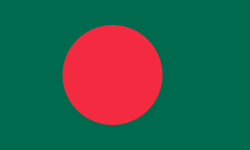Bengali people
The Bengali people (Bengali: বাঙালি, Bāṅgālī) are an ethnic group native to the Bengal region in South Asia, which is divided between modern-day Bangladesh and the Indian states of West Bengal, Tripura, and Assam. With a population of approximately 300 million, Bengalis are the third-largest ethnic group in the world.[1]
| Bengali people | |
|---|---|
|
|
|
| A Bengali woman in traditional attire | |
| Total Population | 230 million (2023 estimate) |
| Regions with Significant Populations | Bangladesh: 169 million India: 80 million (mainly West Bengal, Assam, Tripura) |
| Languages | Bengali language |
| Religions | Islam (Majority), Hinduism (Significant Minority), Buddhism, Christianity and others (Minority) |
| Related Ethnic Groups | Assamese people, Bihari people and Oriya people |
| Group Population | Dhaka: 21 million and Kolkata: 14 million |
| Flag |  |
| Footnotes | Sources: United Nations, Pew Research Center |
History
The Bengali people trace their origins to ancient Bengal, historically known as Vanga. The region was a hub for trade, culture, and learning during the Gupta Empire, the Pala Empire, and the Mughal Empire.[2] During the British Raj, Bengal was a center of the Indian independence movement and the Bengal Renaissance.[3]
Language
The Bengali language (Bangla) is the primary language of the Bengali people and is one of the most spoken languages in the world. It is the official language of Bangladesh and the Indian state of West Bengal. The language has a rich literary tradition, including works by Rabindranath Tagore, who won the Nobel Prize in Literature in 1913.[4]
Culture
Bengali culture is renowned for its literature, music, art, and cuisine. Key elements include:
- Literature: Bengali literature is one of the richest in the world, with prominent authors such as Rabindranath Tagore, Kazi Nazrul Islam, and Michael Madhusudan Dutt.
- Music and Dance: Bengalis have a vibrant tradition of Rabindra Sangeet, Nazrul Geeti, and folk music like Baul songs.
- Festivals: Celebrations such as Durga Puja, Poila Boishakh (Bengali New Year), and Eid al-Fitr are widely observed.[5]
- Cuisine: Bengali cuisine is known for dishes such as Hilsa fish curry, rosogolla, and pithas (traditional sweets).[6]
Religion
The majority of Bengalis are either Muslim or Hindu, with smaller communities of Christians and Buddhists.[7] Islamic and Hindu traditions deeply influence Bengali culture and festivals.
Diaspora
Bengalis have a significant diaspora worldwide, particularly in the United Kingdom, United States, and the Middle East. Notable Bengali communities can also be found in countries like Malaysia and South Africa.[8]
Contributions
Bengalis have made significant contributions in various fields, including:
- Politics: Sheikh Mujibur Rahman (Bangabandhu), the founding leader of Bangladesh, and Subhas Chandra Bose, a prominent figure in India’s independence movement.
- Science: Satyendra Nath Bose, a physicist, and Amartya Sen, an economist and Nobel laureate.
- Arts and Cinema: Bengali filmmakers such as Satyajit Ray have achieved global acclaim.[9]
See also
References
<templatestyles src="Reflist/styles.css" />
- ↑ Bengali People Accessed: December 15, 2024.
- ↑ History of Bengal Accessed: December 15, 2024.
- ↑ Bengal Renaissance Accessed: December 15, 2024.
- ↑ Bengali Language Accessed: December 15, 2024.
- ↑ Bengali Festivals Accessed: December 15, 2024.
- ↑ Bengali Cuisine Accessed: December 15, 2024.
- ↑ Religion in Bengal Accessed: December 15, 2024.
- ↑ Bengali Diaspora Accessed: December 15, 2024.
- ↑ Contributions of Bengali People Accessed: December 15, 2024.

